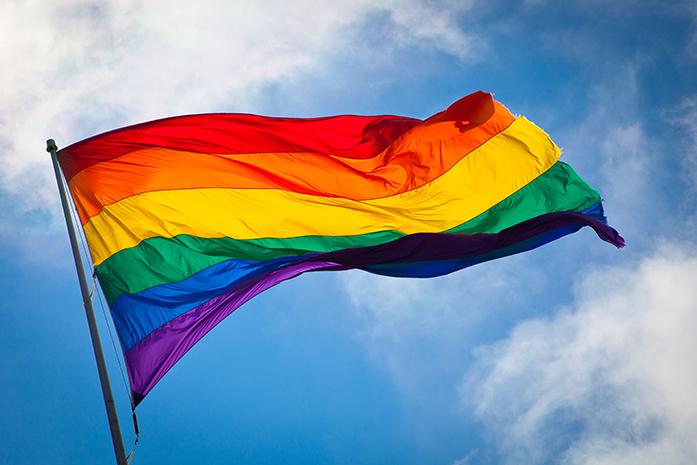Opinion: University of Iowa leaders should promote LGBTQ pride
Remarks from UI President Bruce Harreld have made me reexamine my role as a member of Iowa City’s LGBTQ community. It’s time to be out and proud.
February 2, 2020
Against swathes of bright color all over Iowa City — a backdrop filled with rainbow flags draped along various storefronts and passersby donning vibrant apparel — I attended my first Pride the summer after my freshman year at the University of Iowa.
Wearing a gray shirt, I hoped to make myself as invisible as possible at this very public gathering of the LGBTQ community and its allies. I left with a 36-second video of a drag troupe saved on my phone and a T-shirt from a Pride vendor that read “love is love” in multicolored font. Those items are the only evidence of the three hours I spent at the 2017 Iowa City Pride Festival.
As a bisexual woman, the reserved manner in which I’ve attended Pride events is indicative of how I’ve struggled to come to terms with my identity. Part of me watches my out-and-proud friends every June a little in awe of their bold displays of pride, unapologetically wearing clothing that pops with the bright hues of a rainbow.
I’ve now gone to three Pride parades, each time wondering if this might be the year that I’ll allow myself to embrace it. Each time, I cycle through a number of reasons I deny myself my own queer identity. This celebration isn’t for me; I pass as a straight person and am therefore not prone to the same threats some other LGBTQ individuals face. I’m a journalist; it’s more appropriate to avoid my bisexuality for the sake of objectivity. I’m not gay enough.
But that changed this past weekend. Instead of isolation or shame, the UI’s commemoration of the 1969 Stonewall riots stirred something I hadn’t felt in a long time in regards to my LGBTQ identity — pride.
When people in positions of power affirm you deserve support and have the right to be yourself, you begin to think you are worthy of support and the right to own your identity, too.
UI President Bruce Harreld told the crowd after a showing of Hit the Wall, “I’m very proud. This campus, you have the right to be who you are. We will support you. We will do all the things we can to support you. Period. Full stop.”
There’s something different about a vow of support coming from the highest-ranking UI official. He’s the same man who’s often central to my news scoops at The Daily Iowan.
When people in positions of power affirm you deserve support and have the right to be yourself, you begin to think you are worthy of support and the right to own your identity, too.
RELATED: At UI Stonewall commemoration, university president says ‘we will support you’
It’s important for us to advocate for ourselves, no doubt — that’s what Pride in a post-Stonewall world is about. But leaders have the power and resources to set change in motion, to amplify voices that often go unheard, and to advance equality in ways that those of us with marginalized identities may struggle to accomplish alone.
It’s important for Harreld and any Hawkeye in a leadership role to be vocal about providing support in whatever form it’s needed, to publicly affirm that it is good to be who you are and love who you love.
The more outspoken we are in sharing this message on campus, the better off UI students will be. When we leave this phase of our lives and enter the “real world,” we will be ready to accept those who are different from us with open arms.
Journalists always aim to seek truth and report it. For me to accomplish that, I need to be open with my community about my identity. To share the significance of this one moment, that otherwise may get lost in the shuffle of a university president’s schedule, is vital.
To secure true freedom, we must see the day when our instinct is to share our identities with others. That day will be absent from any fear, prejudice, or shame. Pride won’t be buried deep in the closet 11 months out of the year like my “love is love” T-shirt.
Columns reflect the opinions of the authors and are not necessarily those of the Editorial Board, The Daily Iowan, or other organizations in which the author may be involved.















